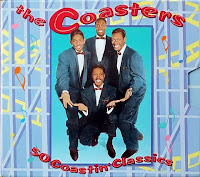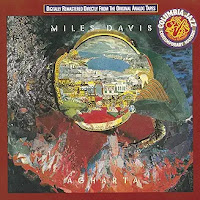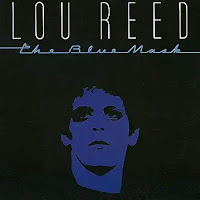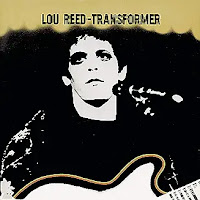How it Started Out and...
At the dawn of the 70s, Lou Reed - like many geniuses of the 60s - had a legacy to live up to. As with the individual Beatles and Dylan, Lou knew any new music he produced would be would be held to that standard, and likely suffer in the comparison. And VU produced a four-album run that stands with the best of them.
As such, his solo records would almost invariably meet with - at best - a mixed reaction. And depending on who you were, those perceptions would change, for better and worse. And throw in the variables of drugs, alcohol, sexual ambiguity, and general assholery, Lou would always provoke strong reactions.
Intimidated by all of that, and with over a dozen albums to choose from, I didn't get my first Lou Reed album until 1982 when he released The Blue Mask. The general consensus was that it was his best record, marking the beginning of his 80s renaissance. Lou Reed had finally produced something that could be mentioned in the same sentence with, say, Loaded.
So why would I spend the time looking back on what was to all concerned a low point? My minimal curiosity was piqued when his first five records covering 1972-76 were put into a single, very reasonably priced package. As long as I was willing to put in the time, I'd finally get to hear it.
So, to paraphrase Monty Python, Lou Reed suffered for his art. Now it was my turn.
Kind of Lou:

Lou Reed (1972)
And we're off to a shaky start.
It must have sounded pretty good at the time, but a bit of a letdown. Fans probably wondered what could have been. Lou was working with six never-released Velvet songs, after all. And once the original VU versions were finally released, they confirmed what already had been. Which was much, much better.
But I came to the VU versions first and was appalled at how poorly the new versions come off. At first, hated this record. But that isn't the only reason.
Let me count the way this album sucks:
- From the dull thumps that start off the record (from that terrible 70s production that took away all the mystery, yet highlighted all the shortcomings of the music) the drumming sounds flat. Not even the Stones would sound good under these circumstances.
- Backup singers are here to shore up Lou, who never needed shoring up before.
- Excellent musicians instead of a band, which is pretty much the opposite of the VU.
- And as I said, inferior versions of songs he originated with VU. Like the first Led Zeppelin album except Lou was stealing from himself.
Let me count those versions. (You know an album is bad when you're resort to arithmetic).
- "I Can't Stand It": Well named! The VU (1985) version is sparer, and far more intense.
- "Walk It and Talk It" is peppy and it rocks, but the rip of the "Brown Sugar" riff is annoying. On its face not bad. But I prefer the slower, bluesy original.
- "Lisa Says": See #1.
- "I Love You": Lame. Earnest is not a good look for Lou.
- "Ride Into the Sun": A bit overdone, but something's got to break through the blurry production.
- "Ocean": It starts with a ludicrous gong(!) and is a bit melodramatic. See #1.
But there are some perfectly good songs here, marred by the production, but not arithmetic:
- "Going Down" is a quintessential album track. Not spectacular but strong. The goddamn backup singers nearly ruin it.
- "Berlin" is pretty good and there's an actual melody and decent singing!
- "Wild Child" is Lou's Dylan song. Another album track that works well.
- "Love Makes You Feel" is the most modest - and thus successful - track on the record.
Lou is playing it safe. After being away for a couple of years, I understand. But the VU would have never stood for it.
And speaking of them, it's obvious how much Sterling Morrison is missed. These guys have the hot licks but they don't have SM's uncanny ability to find the perfect accompaniment to Lou's songs.
Overall, a pretty good record, so I take it back. It doesn't suck. It's worse. It's disappointing.
B
Louie Reed and the Spiders From Mars
Produced by David Bowie, with help from Mick Ronson, it's less cluttered and brighter than its predecessor. Lou sounds relaxed, confident, and funny.
VU Recycles:
"Andy's Chest", which is actually an improvement over the original.
"Satellite of Love", is relaxed enough, but still slightly subpar to the superb original.
Catchy, but not Great. No one knew it at the time, but it adds up to the best anyone could expect of Lou in the seventies.
A-
After the commercial success of Transformer, Lou had no choice but to show everyone he was above it all. And how would he do that? By making Art. He would bring literature to rock n' roll. And what is the highest form of literature? Shakespeare, of course!
LouReedian Tragedy:
This is what we used to call a Rock Opera, but no one would have had the nerve to call it that in front of Lou. Especially since he made it about a sadomasochistic relationship between two junkies. And in case you didn't get it already he rubs it in our faces, making it as grim and ugly as possible. In other words, he was no longer the miraculously detached singer of the VU, who could tell you about the nasty side of life without wallowing in it.
The production is excellent - the sound is big, clear, and spacious. But, not content with a mere rock n' roll band to fill it (or god forbid, leave some of that space alone), Lou and producer Bob Ezrin couldn't resist adding strings and a full orchestra. And maybe it's me, but that's one transformation Lou can't pull off. Sometimes it works, like on "Caroline Says", but even that one goes off the rails at the end.
But I'm happy to report there are a few actual melodies (which Lou actually sings!) and excellent musicianship.
And this time the three recycled VU songs are comparable to the originals. But I'm getting tired of the recycling. Ah, but what's a druggie alcoholic to do when said drugs and alcohol are keeping him from writing? And with that back catalog and all lying around doing nothing...
Apparently, the album they delivered to the record company ran over sixty-five minutes. Said record company didn't want to release a double album, so Bob Ezrin managed to cut it down to ten overlong songs. I'll bet if he just edited them each down he might have fit them all on, and that might have helped clarify the story. As it is, the three longest ones drag out the ending
I suspect I'm looking a gift horse in the mouth. Maybe it's my discomfort with all the bells and whistles in service of Lou.
It's a real mixed bag. Very ambitious, with some successes. A few misfires. Lou with an orchestra. And sad. Very, very sad.
At least for all its cynicism, Three Penny Opera was kind of fun. This one's no fun at all. Lou wouldn't approve.
B+
So of course it was a bust and of course, the record company wanted a hit so they put out a very good live album made up almost entirely of VU songs.
But by this point, his fans were starving for some Good Old/New Lou. The rest just wanted to see him die in public. Every artist has a subset of such fans. It's just that with his prodigious drug taking, he raised the subject himself, thus putting him a close second in the Who's Gonna Die Next competition after - who else - Keith Richards.
Anyway, not being one who liked being told what to do, what did Lou provide his rock and roll-starved fans? An R&B record, of course.
Soul Brother Lou:
It must have sounded heretical to those rock n roll-loving (but probably black people-hating) fans. Now though it sounds pretty good. Yes, the slick musicianship doesn't really fit him, but if you pretend it's someone else it's really all right. (It almost is someone else, since his role was limited to getting wheeled into the studio to sing, and then wheeled right back out again.)
It would help if he were a little kinder but he can only manage that on one or two songs. Any more than that and it wouldn't be Lou Reed. And yet the arrangements - done by someone else - increase the fun factor somewhat.
And not a single VU song. Progress!
By some miracle - catchy songs maybe? - it actually sold pretty well. But the record company probably figured they got lucky and put out another live album, just to be on the safe side. And that sold well, too.
Louless
Lou noted a correlation between the high record sales for Sally Can't Dance and his very low level of actual participation in it.
He also felt like a sellout (again). He'd grown to despise his fans and his record company (Hey Lou, everyone hates their record company).
And wouldn't you know he found a solution to both issues? He took the next logical(?) step of removing himself completely from the music by propping up a bunch of electric guitars in front of a set of amps and letting 'em rip.
The result -
Metal Machine Music - was a double album of screeching feedback and echo. Essentially two raised middle fingers to all involved.
I
finally listened to it (on youtube.com because even I have my limits) last week. And, well...I've heard worse. Not a ringing endorsement, but also not the worst record of all time. (I reserve that judgment for the mild, the safe, the wholesome, and the uplifting.) But I'm spending too much time with Lou to figure out my WOAT at the moment.
Many were sold, but few found it pleasing. After a record number of returns the phrase "career suicide' started making the rounds...
So after all that, Lou decided to buckle down and do something Good. And he did, kind of.
A New, Improved Lou!
And it's... good. But nothing to get excited about. It must have seemed like manna from hell at the time but everyone was just so parched that warm spit would have sufficed. That they got water with an ice cube was nothing to write home about.
One step back is the depressingly mediocre version of
"She's My Best Friend". The
original had a melody, singing, and some energy. But Lou was past all that, thinking his lyrics were people bought music for. And "Nobody's Business" is the same old
don't tell me I'm a drug addict BS.
The title cut is likely the highlight, lack of melody and all.
B+

Lou, looking happy for once in his miserable life, with his "friend Rachel", who inspired the record.
Epitaph:
There's a second volume to this series, covering studio albums 6-10, but I think we've heard enough. If you don't believe me, ask Johnny Rotten from 1980, after Sid Vicious was found dead:
Reporter: Did Sid die for Lou Reed's sins?
John Lydon (Johnny Rotten): Yes, too many Lou Reed albums I blame it on. There was that horrible movement from New York to London, and they brought their dirty culture with them. Sid was so impressed by the decadence of it all. God! So dreary.
To be fair, it didn't help that Lou - besides being a huge asshole and drug addict - was bi-sexual (at the very very least), and remarkably open about it, too. Transformer brought him into the Glam Rock arena, which was criticized by many, including 15-year-old Dead/Allmans fan (and somewhat homophobic) me as "not being about the music." I was wrong-ish, and the outright homophobes were far wronger. But it was just one more thing for people to hold against him.
He was also the '70s version of the guy who did his own research (on drugs no less). And wondered why he wasn't writing great songs. He just knew it wasn't the drugs!
But being a huge asshole and drug addict DID NOT HELP.
...How It's Going
Next: Lou finally gets it right.







































